Tokyo Governor Yuriko Koike yesterday won a second term to head the Japanese capital, buoyed to victory by public support for her COVID-19 pandemic handling, despite a recent rise in infections that has raised concerns of a resurgence of the disease.
In her victory speech, Koike pledged to do her utmost to take measures to protect Tokyo residents amid the pandemic.
“The most pressing task is coronavirus measures,” she said. “Now is a very important time to prepare for a possible second wave, and I will continue to firmly take steps.”
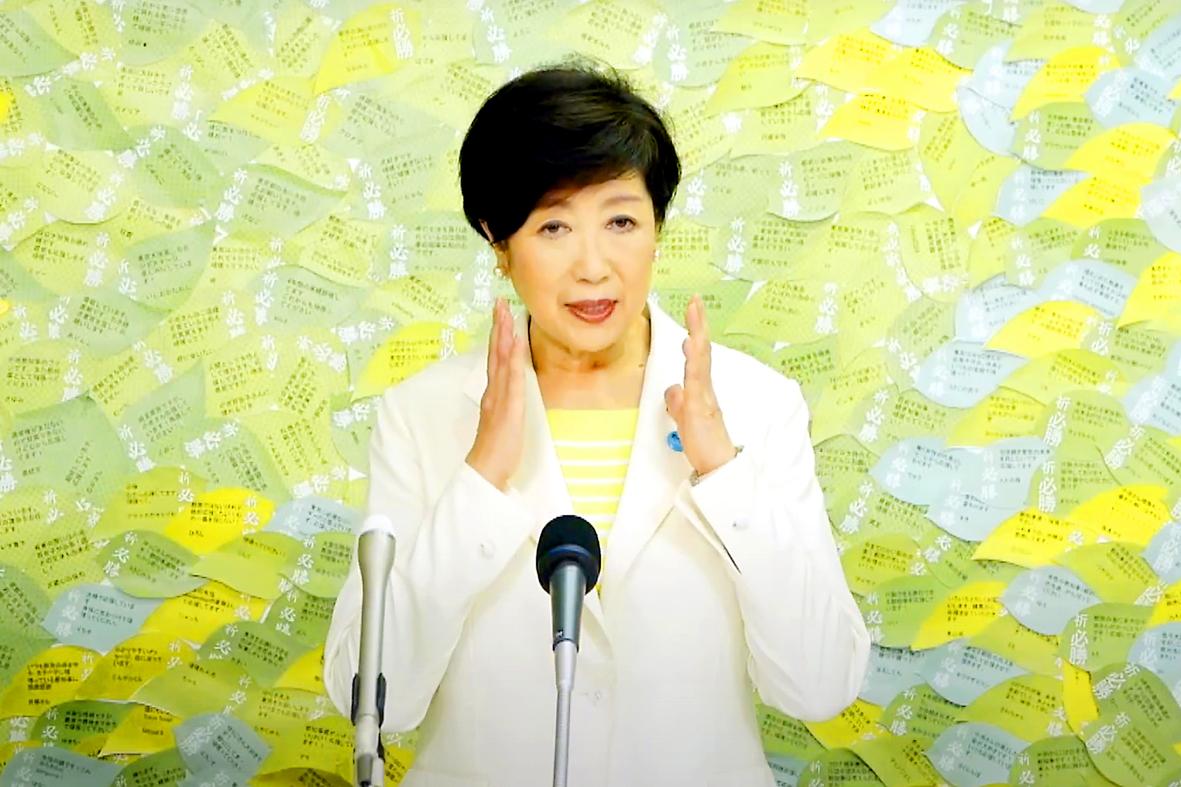
Photo: AP
Japan Broadcasting Corp said its exit polls showed that 74 percent of respondents supported Koike, with 63 percent saying they approved of her handling of the coronavirus crisis.
The first woman to head Tokyo, Koike, 67, is viewed as a potential candidate to succeed Japanese Prime Minister Shinzo Abe when his term ends in September next year.
For now, she says she is focused on protecting the lives of the 14 million people in Tokyo, a megacity with a US$1 trillion economy.
“Fighting against the coronavirus for the residents of Tokyo is my first and foremost responsibility,” she said on the eve of the election.
In her campaign message online, Koike pledged to balance disease prevention and the economy under Tokyo’s “new normal.”
Tokyo’s infections late last month started to rebound to reach 131 confirmed cases on Saturday, topping 100 for a third straight day and hitting a two-month high.
New daily cases have also spiked in the past few weeks nationwide to about 19,700, including 977 deaths.
Koike’s challengers included popular actor-turned-politician Taro Yamamoto and veteran lawyer Kenji Utsunomiya.
Yamamoto wanted to cancel the Tokyo Olympics — which were postponed from this summer to next summer — and use the funds to help people hurt by the coronavirus crisis.
Utsunomiya called for better welfare support for a more inclusive and diverse society.
Koike’s victory was expected, with a recent poll by the Mainichi newspaper having her leading her opponents by a wide margin.
Outside a polling station in downtown Tokyo, retiree Hidekazu Tamura said he voted for Koike because of her effort to secure the Olympics.
“I say no to anyone who is against the Olympics,” he said.
Another voter, Yojiro Tsuchiya, said he does not think Koike has addressed growing concerns about the latest jump in infections.
Among other things, Koike has said Japan should have its own version of the US Centers for Disease Control and Prevention.
She also tried to gain public understanding for a simpler version of the Tokyo Olympics after the Games were postponed.
Although Koike has not fully delivered on promises to Tokyo residents to relieve congestion on commuter trains, ensure adequate availability of child and elderly care facilities and end overwork, even her critics have generally lauded her handling of the pandemic.
That is in sharp contrast to Abe, who has been criticized for doing too little, too late.
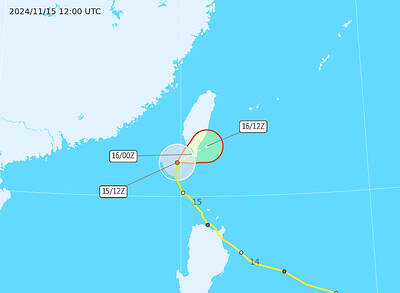
Typhoon Usagi yesterday had weakened into a tropical storm, but a land warning issued by the Central Weather Administration (CWA) was still in effect in four areas in southern Taiwan. As of 5pm yesterday, Tropical Storm Usagi was over waters 120km south-southwest of Oluanpi (鵝鑾鼻), the southernmost tip of Taiwan proper, and was moving north at 9kph, CWA data showed. The storm was expected to veer northeast later yesterday. It had maximum sustained winds of 101kph, with gusts of up to 126kph, the data showed. The CWA urged residents of Kaohsiung, Pingtung County, Taitung County and the Hengchun Peninsula (恆春) to remain alert to
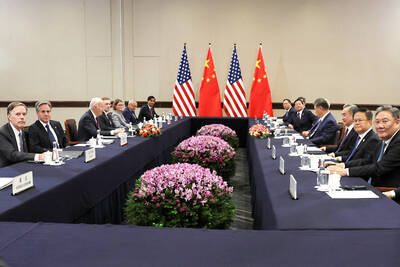
ONE LAST TALK: While Xi said that Taiwan was a ‘red line,’ Biden, in what is likely his last meeting with Xi as president, called for an end to China’s military activity around Taiwan China’s military intimidation and economic coercion against Taiwan are the main causes of tensions that are destabilizing peace in the Taiwan Strait, Taipei said yesterday while thanking US President Joe Biden for expressing Washington’s firm stance of maintaining peace and stability in the region. Biden and Chinese President Xi Jinping (習近平) met on Saturday for their third meeting and their first talks in seven months on the sidelines of the APEC forum in Lima, Peru. It was likely Biden’s last meeting as president with Xi. During their conversation, Biden reiterated the US’ opposition to any unilateral change to the “status quo” from either
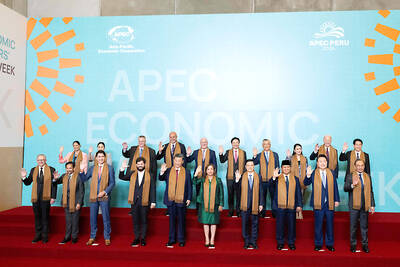
Taiwan would participate in the 2026 APEC summit to be hosted by China after Beijing promised it would ensure the personal safety of attendees, Taiwanese national security sources said yesterday. The APEC Leaders’ Machu Picchu Declaration announced yesterday said that China would host the APEC summit in 2026. Beijing proposed hosting the summit shortly before this year’s gathering began on Friday, a national security official said, speaking on condition of anonymity. Many APEC members expressed concerns about China hosting the event and said that prior communication over the decision was insufficient, the official said. Taiwan brought up concerns about legal “guidelines” China announced in
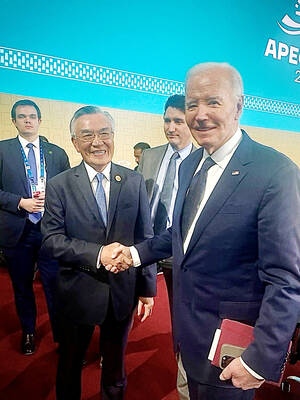
MEET AND GREET: The White House, which called the interaction ‘just a handshake,’ did not immediately respond to a request for comment on whether Biden planned to visit Taiwan’s envoy to the APEC summit, Lin Hsin-i (林信義), on Friday invited US President Joe Biden to visit Taiwan. During the APEC Leaders’ Informal Dialogue, Lin, who represented President William Lai (賴清德) at the summit, spoke with Biden and expressed gratitude to the outgoing US president for his contribution to improving bilateral ties between Taipei and Washington over the past four years, the Ministry of Foreign Affairs said. Lin and Biden exchanged views during the conversation, with Lin extending an invitation to Biden to visit Taiwan, it said. Biden is to step down in January next year, when US president-elect Donald Trump is